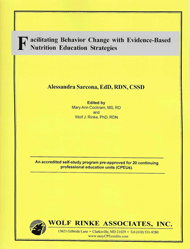Facilitating Behavior Change with Evidence-Based Nutrition Education Strategies

| T353 |
20 CPEUs |
HARD COPY |
Currently out of stock.
New inventory coming soon. |
|
| T353E |
20 CPEUs |
ELECTRONIC |
Temporarily unavailable.
Updated version coming soon! |
|
|
This activity is ideal for diabetes
educators and a must for anyone who works with the public. Learn
how to:
- apply the principles of nutrition education
- recognize the challenges facing nutrition educators
- realize the role theory plays in designing nutrition interventions
- select suitable intervention strategies for various subgroups of
the population
- apply various communication strategies
- utilize effective communication skills with clients and program
participants
- identify the characteristics of lectures and group discussions
- deliver successful presentations
- recognize the significant role mass media plays in nutrition education
- develop effective tools to communicate nutrition messages
- recognize common pitfalls of ineffective educational tools
- identify appropriate content and designs for print materials
- write effective manuals and lesson plans
- develop appropriate visual aids
Share with a friend and Save! Click here for important information about
sharing.
To order an ADDITIONAL Reporting Form click below:
| T353F |
20 CPEUs |
REPORTING FORM |
Currently out of stock.
New inventory coming soon. |
|
Facilitating Behavior Change with Evidence-Based Nutrition Education Strategies
© 2024 Wolf Rinke Associates. All rights reserved for this self-directed accredited learning activity. Reproduction in whole or part without written permission, except for brief excerpts, is prohibited.
GOAL AND OBJECTIVES
Goal
To provide nutrition professionals with an understanding of the factors
influencing human dietary behavior.
Objectives
After reviewing and applying the information presented in this accredited, self-directed
learning program you will be better able
to:
1. Apply the principles of nutrition education
- Recognize the challenges facing nutrition educators
- Realize the role theory plays in designing nutrition interventions
- Select suitable intervention strategies for various subgroups of
the population
2. Apply various communication strategies
- Utilize effective communication skills with clients and program
participants
- Identify the characteristics of lectures and group discussions
- Deliver successful presentations
- Recognize the significant role mass media plays in nutrition
3. Develop effective tools to communicate nutrition messages
- Recognize common pitfalls of ineffective educational tools
- Identify appropriate content and designs for print materials
- Write effective manuals and lesson plans
- Develop appropriate visual aids
ABOUT THE AUTHOR
Alessandra Sarcona, EdD, RDN, CSSD, also known as Sandy, is an Assistant Professor at West Chester University of Pennsylvania in the Department of Nutrition. She was previously employed at Long Island University for 27 years as an Adjunct Professor, Clinical Coordinator, and Dietetic Internship Director.
Dr. Sarcona earned her Bachelor of Science degree at East Carolina University, completed her Dietetic Internship at Yale-New Haven Hospital, Master of Science degree at New York University, and Doctorate in Interdisciplinary Educational Studies at Long Island University.
Dr. Sarcona’s research focuses on nutrition and lifestyle behaviors of various population groups and outcomes of teaching strategies in the classroom. In addition to teaching in higher education, she has worked in clinical dietetics, and nutrition and wellness. She is a certified specialist in sports dietetics (CSSD) and has conducted numerous workshops and lectures on sports nutrition for athletes. Dr. Sarcona participated in a test item writer workshop sponsored by the Commission on Dietetic Registration (CDR) and uses this work in her classroom testing and in the development and review of study guides for Wolf Rinke, Inc. She is presently the chairperson for the Nutrition and Dietetic Educators and Preceptors (NDEP) Development Committee, providing resources for nutrition educators and preceptors.
Return to the top of page
If you prefer to order by phone, mail
or fax click below
or click here to contact us with
other questions.
For information about our other products and
services return to the sidebar at the top of the page.
|

